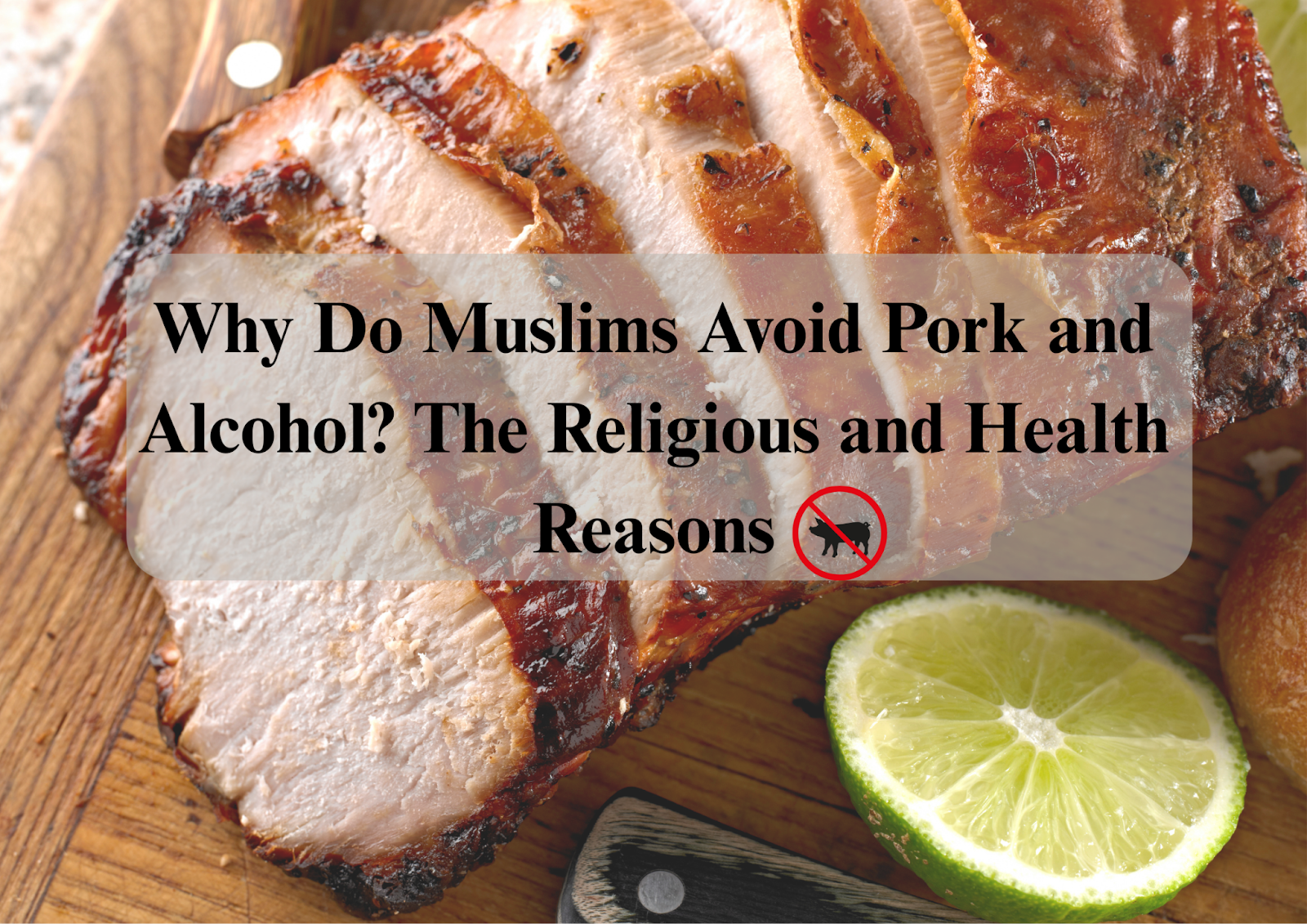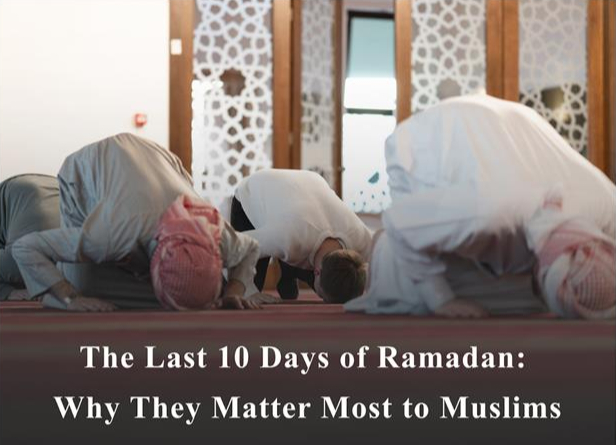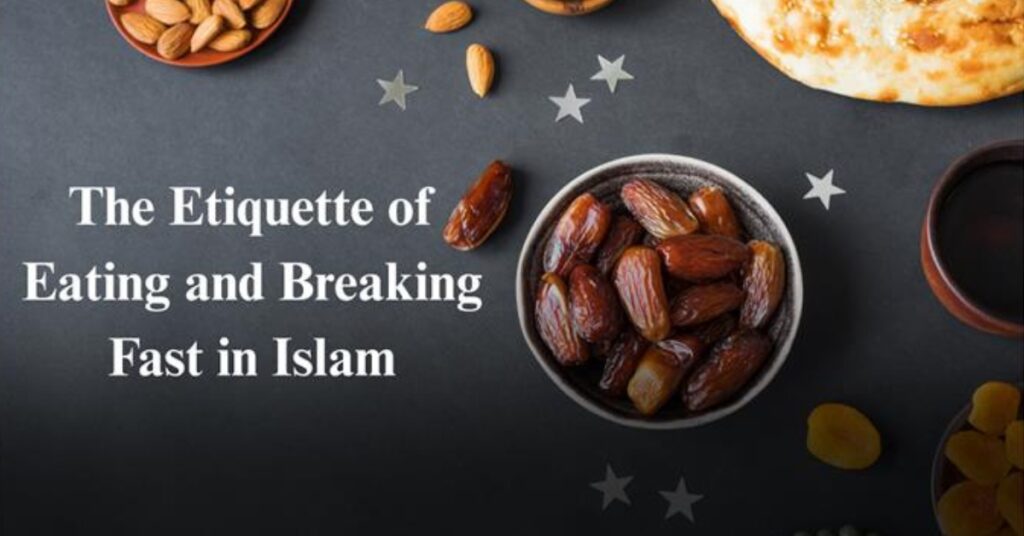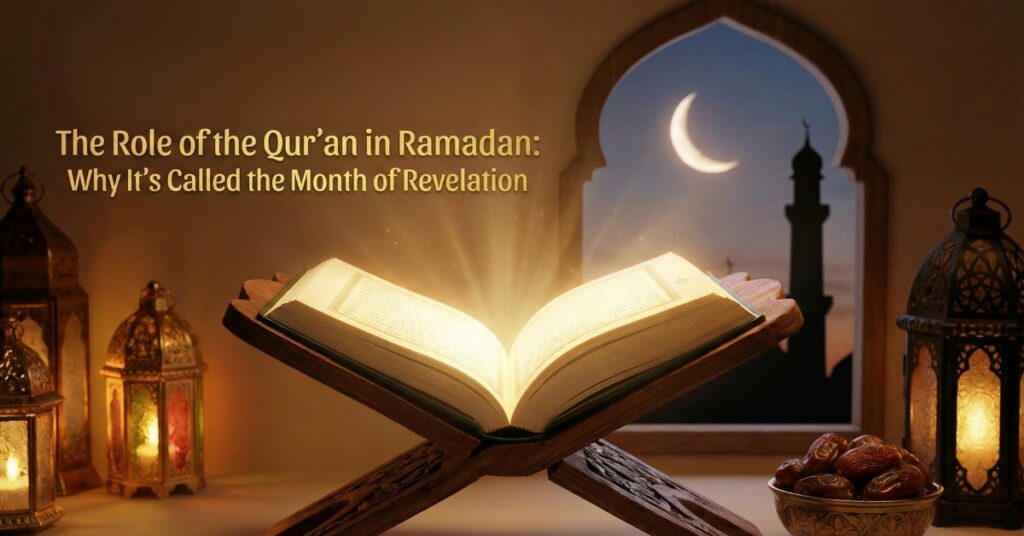One of the most common questions people have about Islam is why Muslims don’t eat pork and drink alcohol. To outsiders, these restrictions may seem unusual, but within Islam, they are deeply rooted in Islamic dietary laws, spiritual discipline, and health protection.A Muslim is the one who has accepted Islam and knows that there is no power besides Allah. A true Muslim lives only in the teachings of the Quran and Sunnah. He always does things that are Halal and he doesn’t do things that are Haram, be it his actions or the food he eats. The teachings come directly from the Quran and Hadith, making them both a matter of faith and well-being.
This blog explores the religious and health reasons behind these prohibitions, the wisdom in halal and haram foods, and how Islam on health and food emphasizes balance and purity.
Quranic Guidance on Pork Prohibition
The Quran on pork prohibition is clear and repeated in several verses.The Almighty has forbidden four things to consume in the Holy Quran. Pork is one of them. This reason alone is enough for us to avoid eating pork. It is considered impure (najis) and harmful, and Muslims are instructed to avoid it completely.
Allah says in the Quran:
“He has only forbidden you ˹to eat˺ carrion, blood, swine,1 and what is slaughtered in the name of any other than Allah.”
(Quran 2:173)
“Forbidden to you are carrion, blood, and swine; what is slaughtered in the name of any other than Allah; what is killed by strangling, beating, a fall, or by being gored to death; what is partly eaten by a predator unless you slaughter it; and what is sacrificed on altars. ”
(Quran 5:3)
These verses directly explain why Muslims don’t eat pork and drink alcohol. Pork is not just a matter of cultural preference—it is explicitly declared haram (forbidden).
Prophetic Teachings and Hadith
The Prophet Muhammad (peace be upon him) reinforced these Quranic instructions. Regarding alcohol, The Prophet (ﷺ) said:
” If a large amount of anything causes intoxication, a small amount of it is prohibited.”
(Sunan Abu Dawood, Hadith 3681)
Another hadith narration goes:
The Prophet (ﷺ) said: Allah has cursed wine, its drinker, its server, its seller, its buyer, its presser, the one for whom it is pressed, the one who conveys it, and the one to whom it is conveyed.
(Sunan Abi Dawud 3674)
This Hadith emphasizes that even small amounts of alcohol are not permitted, answering clearly why alcohol is forbidden in Islam.
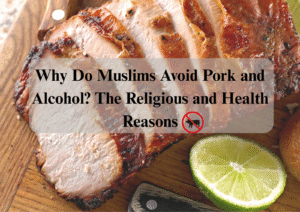
Similarly, Prophet Muhammad ﷺ taught Muslims to avoid doubtful foods and always choose purity, guiding them toward halal and haram foods that ensure both spiritual and physical health. The Western market has many things in the form of cakes, icecreams, gelatos, gelatins that are used in making desserts which have animal fat. This animal fat might be of animals (cow, sheep or goat) which are Halal and are slaughtered in the name of Allah or might of any dead animal or of pork which is strictly prohibited for us. So, it is better to avoid those things which might take our Imaan away from us. Allah has given us so many Halal foods of which we should be grateful and enjoy those wholeheartedly without any guilt.
Why Alcohol is Forbidden in Islam
The prohibition of alcohol is not only spiritual but also practical. Alcoholic drinks and other artificial stimulants can cause a person to lose all sense of reality. Under the influence of such substances understanding of what is right and wrong becomes distorted. They lose control over their mind and body. Allah says:
“O believers! Intoxicants, gambling, idols, and drawing lots for decisions are all evil of Satan’s handiwork. So shun them so you may be successful.”
(Quran 5:90)
In the next verse of this chapter of Quran it’s very clear of the consequences of these alcohols and drugs. Allah says that:

Ibn ‘Umar reported Allah’s Messenger (ﷺ) as saying:
“Every intoxicant is Khamr and every intoxicant is forbidden. He who drinks wine in this world and dies while he is addicted to it, not having repented, will not be given a drink in the Hereafter.”
(Sahih Muslim 2003a)
Alcohol clouds the mind, damages judgment, and leads to addiction, crime, and family breakdown. Modern science confirms these dangers, proving the timeless wisdom of the Quran. The verse highlights clearly why alcohol is forbidden in Islam—it harms individuals and societies. Unfortunately, despite Allah’s injunctions against it, some misguided Muslims do drink and even use drugs. Consequently, they begin to forget Allah, forget their prayers and forget the difference between good and bad. It works like a slow poison, infecting their entire being.
Health Reasons Behind the Prohibitions
Pork and Its Health Concerns
- Pork is prone to parasites like tapeworms and trichinosis.
- High in unhealthy fats and toxins which may result in Hypertension, high blood pressure.
- Linked to heart disease and other illnesses.
- Liver Cirrhosis and Cancer
- Multiple Sclerosis
- Hepatitis E Virus
This is why the Quran’s prohibition is not only spiritual but also health-protective. Science uncovers more truths that affirm the wisdom of the creator, it’s just fascinating. What we are told to abstain from faith later gets confirmed in research.
Alcohol and Its Health Impact
- Causes liver damage and cirrhosis.
- Weakens immunity.
- Affects the kidney functions.
- Even moderate consumption (in women) has a great risk of breast cancer.
- Lung diseases like ARDS, pneumonia.
- Leads to accidents, violence, and addiction.
These scientific realities align with the wisdom of Islam on health and food, proving that faith and health go hand in hand. What is mentioned in the Holy book to avoid many years ago is now evident from Medical research and Science.
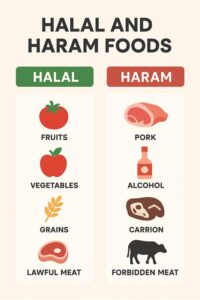
Islamic Dietary Laws: Halal and Haram Foods
Islam encourages moderation, purity, and gratitude in eating and drinking. The framework of Islamic dietary laws guides Muslims to consume only what is halal (permissible) and avoid what is haram (forbidden).
- Halal foods include fruits, vegetables, grains, lawful meat (maybe of sheep, camel, goat, cow, etc slaughtered in the name of Allah), and pure drinks.
- Haram foods include pork, intoxicants, carrion, dead animals and animals not slaughtered according to Islamic law.
This framework ensures Muslims live with discipline, health, and spirituality.
Muslim Food Restrictions: A Way of Life
Many ask about Muslim food restrictions, wondering if they are burdensome. In reality, these restrictions are liberating because they protect believers from harm, health hazards and keep them spiritually conscious.
The Quran states:
“Eat of the good, lawful things provided to you by Allah. And be mindful of Allah in Whom you believe.”
(Surah Al-Ma’idah 5:88)
Thus, food is not just for survival—it is a form of worship when consumed in the right way, being grateful to our Creator for every morsel in your plate.
Conclusion
The question of why Muslims don’t eat pork and drink alcohol has both religious and health-based answers. The primary reason is that it is the command of the Almighty, this alone is sufficient. The one who gave us life, who sustains us every single moment, declares anything to be forbidden then who are we to question His wisdom? Allah created us, he knows what can nourish us, what can harm us and what elevates us. When He commands it is not to restrict but to protect us, guide us, to preserve our dignity and health. Do we even realise how powerful it is?
The Quran on pork prohibition and verses on alcohol make these rules crystal clear. The Prophet Muhammad ﷺ further explained them through Hadith, showing their importance in everyday life. People often ask why not eat pork? What’s the big deal? The Answer is so evident from the Quran (as we saw in this Blog). Do we really believe that the Almighty, who is the most merciful, would prohibit something without Wisdom? Even if the science and doctors had never discovered a single harmful effect of pork, the fact that Almighty asked us to abstain is enough, and that is submission, that is faith.
Far from being mere restrictions, these laws reflect Islamic dietary laws, the wisdom of halal and haram foods, and the holistic vision of Islam on health and food. They remind Muslims to live with discipline, purity, and care for both body and soul. The prohibition is not arbitrary; it comes with layers of wisdom that unfold over time. Understanding Muslim food restrictions helps build bridges of knowledge and respect between different communities, fostering greater appreciation for the wisdom underlying Islamic practices.
Why is alcohol haram in Islam?
It intoxicates, damages health, and harms society. The Quran (5:90) and Hadith strictly forbid it.
Are there any exceptions to eating pork or drinking alcohol?
In cases of extreme necessity where survival is at risk, limited exceptions exist (Quran 2:173), but only until the necessity ends.
What are halal and haram foods?
Halal foods are pure and permissible (fruits, vegetables, halal meat). Haram foods include pork, intoxicants, carrion, and improperly slaughtered animals.
Do Muslim food restrictions affect daily life?
Yes, but positively. They ensure discipline, health, and spiritual connection through mindful eating.
What does halal certification mean for Muslims?
Halal certification ensures food products comply with Islamic dietary laws, are free from pork and alcohol derivatives, and have been processed according to Islamic requirements without cross-contamination with haram substances.
Can Muslims consume foods with trace amounts of alcohol?
Islamic law prohibits any intentional consumption of alcohol, regardless of quantity. However, naturally occurring trace amounts in foods like vanilla extract or fermented products may be permissible according to some scholars, provided intoxication is impossible.

